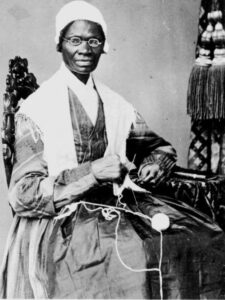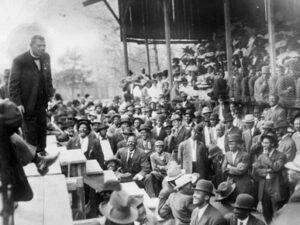In this series, we are celebrating Black History Month and interviewing local African American leaders about their Black History heroes.
Ashley Troutman and his wife, Kia, reside in Lakeland where he has been a lifelong resident. He attended Polk County Public Schools all throughout his primary education and graduated from George Jenkins High School in 1999. Ashley graduated from Polk State College (2001; A. A., Business Administration) and then the University of South Florida (2004) where he received a B.S. in marketing. He currently operates a Northwestern Mutual Financial Services practice here in Lakeland where he assists his clients with comprehensive financial planning strategies. During his adult life, Ashley has served his community in a number of different capacities, including volunteering, board service, and coaching girls basketball.

Kia Troutman

Ashley Troutman
How have your experiences as a person of color shaped you as a leader?
Kia – My experiences as a person of color has allowed me to be empathetic toward others and resilient in the face of adversity.
Ashley – I like your word choice of “shape.” Our past experiences certainly shape us into who we are in the present. As a person of color, you often know that there won’t be much given to you especially considering the fact that there is not always a lot of wealth past down generationally. Therefore, your work ethic is shaped by that knowledge. It’s understood culturally that you must work harder than your contemporaries to prove yourself valuable. I would also say that as a person of color you are often more sensitive to the marginalized understanding that you often walk that path.
Which Black historical figure has most inspired you?

Sojourner Truth
K – I have been inspired by many Black historical figures but will say that Sojourner Truth inspired me because of her courage to speak on the issues of slavery and women’s rights.
A – Although there have been many that have inspired me, the one that comes to mind currently is Booker T. Washington. He was an educator and intellectual who believed that through economic independence and proving ourselves valuable to the market place and productive as citizens, even within a hostile environment we could achieve equality. His influence amongst his white contemporaries allowed him to influence the expansion of educational opportunities for rural African Americans throughout the country. These schools were called Rosenwald Schools and there were about three or four here in Polk County (Union Academy in Bartow, Florence Villa Training School in Winter Haven, Oakland School in Haines City, and Fruitlands Institute in Lake Alfred). He even gave a speech here in Lakeland on March 5, 1912.

Booker T. Washington gives a speech in Lakeland in 1912.
What kind of changes would you like to see made in the community in the near future?
K – I would like to see more intercultural interaction between various groups and the support of minority-owned businesses in various segments of our city.
A – I would like to see an increase in minority business ownership and entrepreneurship by improving the access to capital and resources for those looking to grow their ideas. We need a more equitable business environment where we really take time to understand what barriers of access may exist. Criminal justice reform is another area I’d like to see some changes in. Let’s follow the lead of the federal government as a state and see what adjustments we can reasonably make to create more fairness in our laws. I am a rule follower, but our rules can’t be so legalistic that we don’t allow room for compassion and second chances.
What moment in Black history has had the most impact on you?
K – A moment in Black history that has the most impact on me is when persons of African descent in the United States and Jamaica were physically freed from slavery. The rest of the story is still being written.
A – Again, although there are many, the one that stands out right now is the period of Reconstruction. During this period you saw the 13th, 14th, and 15th Amendments passed in the federal government. Collectively, these amendments were known as the Civil War Amendments. This was also a period of time when you saw a record number of African Americans elected to state and national positions.
